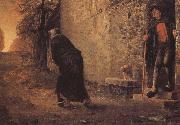Wholesale Oil Painting No Minimum |
|||||||||||
|
|
|||||||||||

|
|||||||||||
|
|
|
||||||||
Jean Francois Millet1814-1875 French Jean Francois Millet Galleries Millet was the first child of Jean-Louis-Nicolas and Aim??e-Henriette-Adelaide Henry Millet, members of the peasant community in the village of Gruchy, in Gr??ville-Hague (Normandy). Under the guidance of two village priests, Millet acquired a knowledge of Latin and modern authors, before being sent to Cherbourg in 1833 to study with a portrait painter named Paul Dumouchel. By 1835 he was studying full-time with Lucien-Th??ophile Langlois, a pupil of Baron Gros, in Cherbourg. A stipend provided by Langlois and others enabled Millet to move to Paris in 1837, where he studied at the Ecole des Beaux-Arts with Paul Delaroche. In 1839 his scholarship was terminated, and his first submission to the Salon was rejected. After his first painting, a portrait, was accepted at the Salon of 1840, Millet returned to Cherbourg to begin a career as a portrait painter. However, the following year he married Pauline-Virginie Ono, and they moved to Paris. After rejections at the Salon of 1843 and Pauline's death by consumption, Millet returned again to Cherbourg. In 1845 Millet moved to Le Havre with Catherine Lemaire, whom he would marry in a civil ceremony in 1853; they would have nine children, and remain together for the rest of Millet's life. In Le Havre he painted portraits and small genre pieces for several months, before moving back to Paris. It was in Paris in the middle 1840s that Millet befriended Constant Troyon, Narcisse Diaz, Charles Jacque, and Theodore Rousseau, artists who, like Millet, would become associated with the Barbizon school; Honor?? Daumier, whose figure draftsmanship would influence Millet's subsequent rendering of peasant subjects; and Alfred Sensier, a government bureaucrat who would become a lifelong supporter and eventually the artist's biographer. In 1847 his first Salon success came with the exhibition of a painting Oedipus Taken down from the Tree, and in 1848 his Winnower was bought by the government. |
||||||||
|
|
||||||||
Wait
Wait Painting ID:: 55848 |
mk245
1860-1861
84.5x121cm
Oil on canvas
mk245 1860-1861 84.5x121cm Oil on canvas |
|||||||
|
|
||||||||
Edouard Vuillard1868-1940 French Edouard Vuillard Galleries Jean-Edouard Vuillard, the son of a retired captain, spent his youth at Cuiseaux (Saone-et-Loire); in 1878 his family moved to Paris in modest circumstances. After his father\'s death, in 1884, Vuillard received a scholarship to continue his education. In the Lycee Condorcet Vuillard met Ker Xavier Roussel (also a future painter and Vuillard\'s future brother in law), Maurice Denis, musician Pierre Hermant, writer Pierre Veber and Lugne-Poe. On Roussel\'s advice he refused a military career and entered the Ecole des Beaux-Arts, where he met Pierre Bonnard. In 1885, Vuillard left the Lycee Condorcet and joined his closest friend Roussel at the studio of painter Diogene Maillart. There, Roussel and Vuillard received the rudiments of artistic training. |
||||||||
|
|
||||||||
|
|
wait
wait Painting ID:: 65990 |
Mk288 1903 cardboard 75.5 x 41cm painting. private Mk288 1903 cardboard 75.5 x 41cm painting. private |
||||||
|
|
||||||||
|
Edouard Vuillard 1868-1940 French Edouard Vuillard Galleries Jean-Edouard Vuillard, the son of a retired captain, spent his youth at Cuiseaux (Saone-et-Loire); in 1878 his family moved to Paris in modest circumstances. After his father\'s death, in 1884, Vuillard received a scholarship to continue his education. In the Lycee Condorcet Vuillard met Ker Xavier Roussel (also a future painter and Vuillard\'s future brother in law), Maurice Denis, musician Pierre Hermant, writer Pierre Veber and Lugne-Poe. On Roussel\'s advice he refused a military career and entered the Ecole des Beaux-Arts, where he met Pierre Bonnard. In 1885, Vuillard left the Lycee Condorcet and joined his closest friend Roussel at the studio of painter Diogene Maillart. There, Roussel and Vuillard received the rudiments of artistic training. wait Mk288 1903 cardboard 75.5 x 41cm painting. private |
||||||||
|
|
||||||||
|
Prev Next
|
||||||||
|
|
||||||||
|
Related Paintings to Edouard Vuillard :. |
||||||||
|
|
||||||||
|
CONTACT US |


